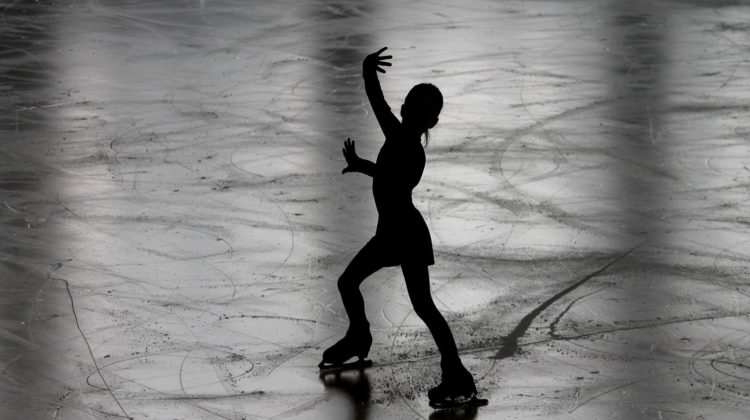
Jessica Shuran Yu condemns training abuse in China
A world championship figure skater has urged the International Olympic Committee to do more to protect vulnerable young girls after detailing how she and others suffered abuse inside the Chinese system.
Jessica Shuran Yu, who was born, raised and trained in China and competed in the world championships before helping to coach junior skaters, told the Guardian that a “culture of physical discipline” was common in the country, with athletes also frequently criticised as “lazy”, “stupid”, “retarded”, “useless” and “fat”.
Yu said she was regularly hit with a plastic skate guard after she made mistakes and another punishment involved being kicked so hard with the toe-pick of a skate that it bloodied her shin and left a lasting scar.
“The abuse started from the age of when I started being told to reach out a hand whenever I made mistakes,” she said. “On especially bad days, I would get hit more than times in a row until my skin was raw.
“When I was and going through puberty, I started to struggle with my jumps because I was gaining weight. I was called over and kicked on the bone of my shin with a toe-pick of a blade and made to try again. I wasn’t allowed to limp or cry.
“Most of the time such abuse happened in front of other skaters in the rink. I didn’t tell any of my friends, adults at school or my federation, because I was incredibly humiliated. I was made to feel so small. It was dehumanising.”
Now , Yu said she decided to speak after watching Athlete A, the Netflix documentary detailing sexual abuse in American gymnastics, and reading claims of widespread abuse in British Gymnastics. On Monday, Human Rights Watch reported that hundreds of child athletes in Japan said they had suffered abuse.
Yu spoke of feeling able to open up because while she had grown up in China and has a Chinese mother, she competed internationally for Singapore, the country of her father’s birth.
The question of whether China pushes athletes beyond acceptable limits has been raised several times, including by Matthew Pinsent, who said he was shocked at the abuse of young gymnasts on a visit before the Beijing Olympics. However, it is highly unusual for an athlete who has trained in the country to speak out.
When Pinsent made his remarks, the IOC said it was inappropriate to comment. Yu said she hoped that with Beijing hosting the Winter Olympics in just over months’ time, the IOC would recognise it had a unique opportunity to use its influence. “In gymnastics and skating classes young children have to put their legs on two stools as a coach applies pressure to stretch them,” she said.
“In my classes, every single person would be sobbing by the end. With one instructor if we cried too much they would add more seconds. I remember thinking this didn’t feel right at all – and that something might tear.”
Yu said young Chinese athletes were abused when she coached recently at a prominent training centre in Beijing. “I saw one junior skater get hit and dragged off the ice, while another was pressured into competing on two torn ligaments, which left them needing surgery afterwards.
“It really hurts me to know that this abuse is still happening. Many athletes and coaches believe that such behaviour is necessary and normal in China. It is also hard for Chinese athletes to speak out. They could lose their spot and their careers could end. But as a Singaporean athlete who trained in China, I feel I am in a unique position.”
Yu urged the IOC to recognise that young and vulnerable girls in aesthetic sports are particularly at risk. She called for it to set up a dedicated hotline staffed by child protection experts for abuse cases and to use more of its resources to better enforce its consensus statement that states “all athletes have a right to be treated with respect, protected from non-accidental violence”.
She said: “There is a toxicity that plagues aesthetic sports like gymnastics and figure skating, which both have environments in which adults can easily exploit young girls with big dreams. I genuinely believe there’s a correlation between the two sports. In both cases we are judged on our appearances. The costume, the makeup, the body image.
“When there’s emphasis on presentation and perfectionism, you’re taught to care about how others perceive you, especially by judges who have power over your scores. So subconsciously you know that speaking out about being hit would ruin this perfectionism.”
In the past week Yu has contacted the Singapore Ice Skating Association and Singapore Safe Sport to detail her experiences and said she was determined to help protect the next generation of young athletes. “There was a point in my life when the abuse made me hate the sport,” she said. “I dreaded going to practice, wished for car accidents and sobbed through entire training sessions. But I know now that what I hated wasn’t skating, it was the cruelty. Young athletes should be able to love their sport without going through what I and so many others have.”
The IOC insisted the safety and wellbeing of athletes was a priority. “Harassment and abuse is unfortunately part of society and also occurs within sport,” it said. “The IOC stands together with all athletes, everywhere, to state that abuse of any kind is contrary to the values of Olympism, which calls for respect for everyone in sport.
“The IOC safeguarding team is in regular contact with national Olympic committees, to offer advice and support, including highlighting the available IOC initiatives – such as the IOC athlete safeguarding toolkit; safe sport educational tools and materials, and initiatives to protect athletes at the Olympic Games and Youth Olympic Games.”
